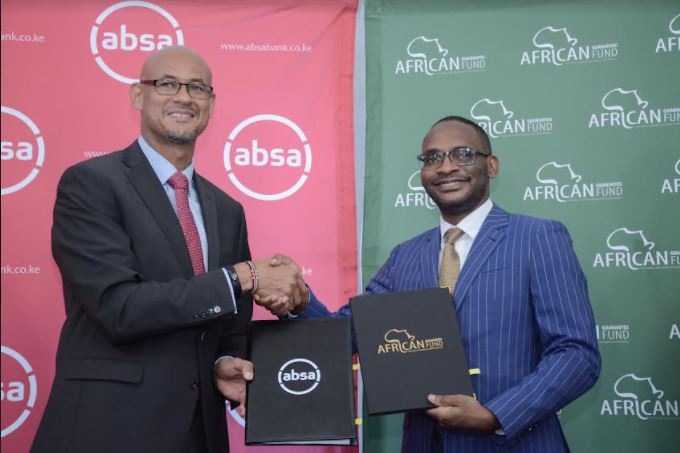Absa Bank Kenya PLC and African Guarantee Fund (AGF) have come up with a KES.1.25 billion Loan Portfolio Guarantee Facility, to increase credit accessibility for local small-scale businesses, including start-ups. The guarantee line will be in existence for a period of five years and provide up to KES.100 million in a single borrower limit.
The co-operation will enable Absa Bank Kenya to support small businesses in enhancing their business managerial capabilities in areas of governance, human capital management, quality control, packaging, financial management and marketing. This will help to scale up SME lending activities in circumstances where the target SME clients are unable to meet collateral threshold requirements.
Absa Bank Kenya Managing Director Jeremy Awori said, the partnership will allow for direct contribution to solving one of the world’s toughest difficulties. That is poverty and inequality reduction, by ensuring financing access among the SMEs.
“Considering the financing gap experienced by most SMEs due to their risk profile and lack of security, the bank is always exploring innovative ways to mitigate possible risks in this segment and at the same time tap into the huge opportunity within this growth sector and driver of our economy,” Mr Awori said.
To qualify dor the funding, targeted businesses must represent new or incremental business only. Geared towards investments and/or working capital for growth with, green and women in business enterprises accessing up to 75 percent cover. Non-green or women-related businesses will receive up to 50 percent of the cover.
On his part, African Guarantee Fund Group CEO Jules Ngankam said, the organisation’s objective is to facilitate SMEs to play their role of being the engine driving economic growth. By removing their biggest obstacle, which is the financing gap, AGF makes it possible for SMEs to increase sustainable growth. And become a source of employment, skills and wealth creation as well. This helps to reduce poverty levels hroughout Africa.
“Beyond the overall SME scope, our partnership with Absa Bank Kenya will provide particular support to women entrepreneurs and SME businesses qualifying as green transactions. This is in line with our commitment to reduce the $42 billion gender financing gap facing women in Africa and on the other hand contribute to sustainable development through mitigation of the impacts of climate change,” said Mr. Ngankam.
He further added that AGF through its Capacity Development programme will support Absa Bank Kenya’s “Let’s Unite to See Her Empowered (SHE)” initiative which targets to reach out to 600 Women-led Enterprises within 12 months.
Over the last few years, Absa Bank Kenya has taken a comprehensive approach to SME empowerment, in which business owners get training on business sustainability, fundraising, bookkeeping, and networking to ensure successful operations through individualised propositions and products.
“Kenya is home to some of the most robust SMEs that play a critical role in the growth and development of the country’s economy for social prosperity. We are therefore excited to be part of this partnership as we believe that empowering SMEs and start-ups not only positively impacts the growth of our economy but also improves the livelihoods of the communities where we operate,” Mr. Awori added.
The bank, through its Wezesha Biashara SME programme launched five years ago, has disbursed almost KES. 50 billion in loans to the sector.
“This is an indicator that as a bank, we are intentional about investing in the growth of the local SME sector which has become the key driver of economic growth, contributing upto 33% of GDP and employing more than 50% of the country’s workforce,” Mr. Awori explained.
Absa Bank’s History in Kenya and Africa
Absa Group Limited (‘Absa Group’) is Absa Bank Kenya parent company and is listed on the Johannesburg Stock Exchange in South Africa. They’re among the Africa’s largestt and diversified financial services groups. Currently, rproviding an integrated set of products and services across personal and business banking, corporate and investment banking as well as wealth, investment management and insurance.
The Group operates in 12 African countries, and has an international representative office in London too. They have approximately 40 000 employees, over 1 000 branches, and approximately 10 000 ATMs.
The Group’s registered headquarters are in Johannesburg, South Africa and they own majority stakes in banks in Botswana, Ghana, Kenya, Mauritius, Moçambique, Seychelles, South Africa (Absa Bank), Tanzania’s (Barclays Bank Tanzania and National Bank of Commerce), Uganda and Zambia. The Group also has representative offices in Namibia and Nigeria. In addition, it runs insurance operations in Botswana, Kenya, Moçambique, South Africa and Zambia.
Absa Kenya Bank’s history traces from 1916 when the National Bank of South Africa (now First National Bank), launched a branch at Mombasa.
In 1925, National Bank of South Africa was integrated with the Anglo-Egyptian Bank and the Colonial Bank to form Barclays Bank (Dominion, Colonial and Overseas). This put the Kenyan operations under Barclays Bank.
The bank was licensed in its current form in 1953 and in 1978 it was incorporated locally as Barclays Bank of Kenya, an entirely owned subsidiary of Barclays Bank International. The bank then listed its shares on the Nairobi Stock Exchange in 1986 through a successful IPO. These shares up to now, trade under the symbol: BARC.
Before 2013, The bank was a subsidiary of Barclays Bank Plc. (through Barclays Africa), an International financial services conglomerate, with shares of stock listed on the London Stock Exchange under the symbol: BARC and on the New York Stock Exchange (NYSE) under the symbol: BCS.
In 2013, Barclays Plc adopted the collective strategy to operate as “One Bank in Africa” with an aim of increasing efficiency and increasing returns from the African Units. This resulted in the merging of all Barclays Plc. businesses in Africa (other than Egypt and Zimbabwe units) through Absa Group Limited, leading to the formation of Barclays Africa Group. The stock of Barclays Africa Group, which owns 68.5% of Barclays Bank of Kenya, is listed on the JSE.
Absa Bank Kenya PLC FAQs
Here are the frequently asked questions by the existing and aspiring Absa Bank Kenya customers, and their answers according to the Absa website.
Why did Absa change from Barclays to Absa?
While Barclays continues to have a significant stake in our parent company, Absa Group, it’s no longer the majority shareholder and the Group has been working to separate its operations in Africa from those of Barclays PLC. We have already separated our Kenya operations from Barclays and we are now legally and officially Absa in Kenya. The rename gave us a great opportunity to roll-out a name and brand that reflects our identity in Africa, and to unite behind a single brand and purpose which is to bring possibility to life.
Why did Absa decide on Absa as their new brand name?
We know how important a decision like this is, and, before coming to any conclusions, Absa Group consulted widely with employees, customers, regulators and other stakeholders across the continent. The outcome of these discussions was that the Group needed one brand to unite operations across Africa. The Absa brand is already well-established and well-known in parts of Africa, and has strong African and international banking credentials. We are excited to have begun a new era as Absa in Kenya.
Does Absa still have a link to Barclays PLC, now that they’ve rebranded to Absa?
Barclays PLC continues to be a key stakeholder and shareholder in our parent company, Absa Group Limited, owning 14.9%.
Is my money safe with Absa Bank?
You can bank with us as safely as you always have. Absa Group is one of the largest banking groups in Africa, with a balance sheet of more than USD$91 billion (as at 30 June 2019) as well as new systems with robust security provisions.
Do I have to change my account details?
No, our name has changed, but your bank details have not. You do not need to change your account details. We urge you to be vigilant at all times, as fraudsters are always looking for an opportunity to obtain important personal information by masquerading as your bank. They may use our name change as an opportunity to ask you to change your details.
Such messages do not come from us – your bank account details (including account number and branch code) will not change.
Did the changes affect the products and services?
No, our name change has not affected your existing products or services. In fact, you can look forward to new and innovative products and services now that we’ve changed to the Absa brand.
Have the bank charges/rates changed?
Bank charges and rate changes happen from time to time in most banks. Any changes to bank charges or rates will not be a result of our name change, but would happen as part of our normal course of business.
What has changed?
Our name has officially changed to Absa Bank Kenya PLC. In recent months, you may have seen us introduce a warm, vibrant red colour palette across our branches and ATMs. This process will continue, and eventually all Barclays branding will be removed across our operations.
There may still be some Barclays branding visible for the next short while, but we’ll remove all such branding by mid-2020 at the latest, in line with our parent company’s agreement with Barclays PLC.
All customer services continue as before, and customers are encouraged to apply for newly-branded Absa cards as well as cheques books and download our updated mobile apps.
Our banking site is now www.absabank.co.ke.
Branch colleagues have stylish new uniforms reflecting our new warm, vibrant red colour palette.
Customers can look forward to new and innovative products and services from Absa Bank Kenya.
Who can I contact for more information?
If you have a specific query or have a question that has not been answered, you can contact our customer careline on (020) 3900000 or 0722130120 or 0732130120, or speak to any of our branch staff, or visit www.absabank.co.ke.



